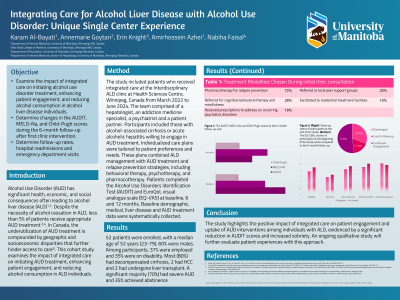Monday Poster Session
Category: Liver
P2926 - Integrating Care for Alcohol-Associated Liver Disease With Alcohol Use Disorder: Unique Single Center Experience
Monday, October 28, 2024
10:30 AM - 4:00 PM ET
Location: Exhibit Hall E

Has Audio

Karam Al-Bayati, MD
University of Manitoba
Winnipeg, MB, Canada
Presenting Author(s)
Karam Al-Bayati, MD1, Annemarie Goytan, MS2, Erin Knight, MD1, Amirhossein Azhie, MD1, Nabiha Faisal, MD, MSc1
1University of Manitoba, Winnipeg, MB, Canada; 2Max Rady College of Medicine, University of Manitoba, Winnipeg, MB, Canada
Introduction: Alcohol Use Disorder (AUD) has significant health, economic, and social consequences often leading to alcohol liver disease (ALD). Despite the necessity of alcohol cessation, < 5% of patients receive appropriate AUD care. In Canada, the underutilization of AUD treatment is compounded by geographic and socioeconomic disparities that further hinder access to care. This study examines the impact of integrated care on initiating AUD treatment, enhancing patient engagement, and reducing alcohol consumption in ALD patients
Methods: The study included patients who received integrated care at the Interdisciplinary ALD clinic at Health Sciences Centre, Winnipeg, Canada from March 2022 to June 2024. The interdisciplinary team comprised a hepatologist, addiction medicine specialist, psychiatrist and a patient partner. Participants included those with alcohol-associated cirrhosis or alcoholic hepatitis willing to engage in AUD treatment. Individualized care plans were developed, tailored to patient needs. The plans combined ALD management with AUD treatment and relapse prevention strategies, including behavioural therapy, psychotherapy, and pharmacotherapy. Patients completed AUDIT and EQ-VAS at baseline, 3 and 6 months. Baseline demographic, medical, liver disease and AUD treatment data were collected
Results: 52 patients were enrolled, median age 52 years (23-79), 60% males and 46% rural dwellers. Among participants, 37% were employed and 35% were on disability. 80% had decompensated cirrhosis, 2 had hepatocellular carcinoma and 2 had liver transplantation. A significant majority (70%) had severe AUD. Of the participants, 72% received pharmacotherapy for relapse prevention, and 28% were referred for cognitive behavioural therapy. Additionally, 18% received prescriptions to address co-occurring psychiatric disorders, 20% were referred to local peer support groups, and 10% were facilitated to residential treatment facilities. During the 6-month follow-up, AUDIT scores decreased notably from 21 to 11. Approximately 35% of patients achieved abstinence or maintained sobriety. However, there were no significant changes in MELD-Na and Child-Pugh scores, nor in hospital admissions 6 months post-integrated care
Discussion: The study highlights the positive impact of integrated care on patient engagement and uptake of AUD interventions among individuals with ALD, evidenced by a significant reduction in AUDIT scores and increased sobriety. An ongoing qualitative study will further evaluate patient experiences
Disclosures:
Karam Al-Bayati, MD1, Annemarie Goytan, MS2, Erin Knight, MD1, Amirhossein Azhie, MD1, Nabiha Faisal, MD, MSc1. P2926 - Integrating Care for Alcohol-Associated Liver Disease With Alcohol Use Disorder: Unique Single Center Experience, ACG 2024 Annual Scientific Meeting Abstracts. Philadelphia, PA: American College of Gastroenterology.
1University of Manitoba, Winnipeg, MB, Canada; 2Max Rady College of Medicine, University of Manitoba, Winnipeg, MB, Canada
Introduction: Alcohol Use Disorder (AUD) has significant health, economic, and social consequences often leading to alcohol liver disease (ALD). Despite the necessity of alcohol cessation, < 5% of patients receive appropriate AUD care. In Canada, the underutilization of AUD treatment is compounded by geographic and socioeconomic disparities that further hinder access to care. This study examines the impact of integrated care on initiating AUD treatment, enhancing patient engagement, and reducing alcohol consumption in ALD patients
Methods: The study included patients who received integrated care at the Interdisciplinary ALD clinic at Health Sciences Centre, Winnipeg, Canada from March 2022 to June 2024. The interdisciplinary team comprised a hepatologist, addiction medicine specialist, psychiatrist and a patient partner. Participants included those with alcohol-associated cirrhosis or alcoholic hepatitis willing to engage in AUD treatment. Individualized care plans were developed, tailored to patient needs. The plans combined ALD management with AUD treatment and relapse prevention strategies, including behavioural therapy, psychotherapy, and pharmacotherapy. Patients completed AUDIT and EQ-VAS at baseline, 3 and 6 months. Baseline demographic, medical, liver disease and AUD treatment data were collected
Results: 52 patients were enrolled, median age 52 years (23-79), 60% males and 46% rural dwellers. Among participants, 37% were employed and 35% were on disability. 80% had decompensated cirrhosis, 2 had hepatocellular carcinoma and 2 had liver transplantation. A significant majority (70%) had severe AUD. Of the participants, 72% received pharmacotherapy for relapse prevention, and 28% were referred for cognitive behavioural therapy. Additionally, 18% received prescriptions to address co-occurring psychiatric disorders, 20% were referred to local peer support groups, and 10% were facilitated to residential treatment facilities. During the 6-month follow-up, AUDIT scores decreased notably from 21 to 11. Approximately 35% of patients achieved abstinence or maintained sobriety. However, there were no significant changes in MELD-Na and Child-Pugh scores, nor in hospital admissions 6 months post-integrated care
Discussion: The study highlights the positive impact of integrated care on patient engagement and uptake of AUD interventions among individuals with ALD, evidenced by a significant reduction in AUDIT scores and increased sobriety. An ongoing qualitative study will further evaluate patient experiences
Disclosures:
Karam Al-Bayati indicated no relevant financial relationships.
Annemarie Goytan indicated no relevant financial relationships.
Erin Knight indicated no relevant financial relationships.
Amirhossein Azhie indicated no relevant financial relationships.
Nabiha Faisal: Advanz – Advisory Committee/Board Member, Consultant. Intercept – Advisory Committee/Board Member, Consultant.
Karam Al-Bayati, MD1, Annemarie Goytan, MS2, Erin Knight, MD1, Amirhossein Azhie, MD1, Nabiha Faisal, MD, MSc1. P2926 - Integrating Care for Alcohol-Associated Liver Disease With Alcohol Use Disorder: Unique Single Center Experience, ACG 2024 Annual Scientific Meeting Abstracts. Philadelphia, PA: American College of Gastroenterology.
